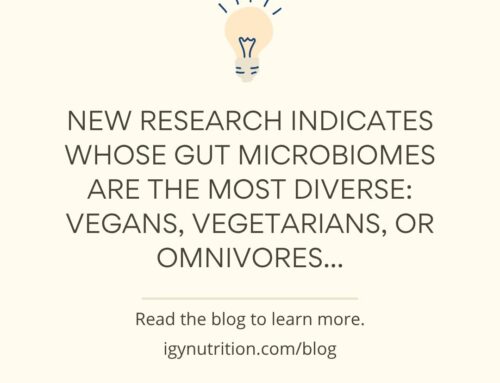If you’ve got iffy gut health – dysbiosis, SIBO, hormone fluctuations, whatever the culprit is – you might have a love-hate relationship with holiday dinner spreads.
Glazed meats + stuffing + egg nog + pie should equal joy, not food comas! (Well, maybe a small one).
The holidays are stressful enough as they are – we’re not here to police you on your holiday food choices.
Instead, we put together some tips to make holiday eating easier on your gut.
Less bloating = more fun! Let’s dive in.
Optimize Food Breakdown
The most important step to combatting holiday dinner bloat is enhancing your digestive system’s ability to break all that fancy food down.
Chewing
You might roll your eyes at this first tip, but trust us on this one: chew your food slowly. Making sure your food is broken down thoroughly before allowing your stomach and intestinal microbiome to take a crack at it will make your gut’s job easier.
You’ll likely need a bigger gun than thorough chewing if you’ve got a sensitive stomach. That’s where digestive enzymes come in!
Stomach Acid
When you chew and swallow your food, its first stop is the stomach, where the food is broken down in preparation for absorption in the intestines (1).
Your stomach, a muscle, uses contractions to begin that process. But it needs a bit of chemical “umph” to get the job done: stomach acid (1,2).
Stomach acid is a mix of acids and enzymes that break down food into an absorbable form. Without it, we wouldn’t be able to use food for energy (2).
Low stomach acid can lead to a host of digestive symptoms. Check out our blog titled “Do you Have Enough Stomach Acid” to learn more.
Sometimes, over-eating or consuming hard-to-digest foods can make the thorough breakdown of food challenging to achieve.
Consuming digestive enzymes and stomach acid supplements before your meal may make breaking down your food more manageable.
Purchasing Supplements
You’ll want to purchase high-quality stomach acid supplements and digestive enzymes.
If you need hardcore stomach acid support, check out the Spectrazyme Metagest by Metagenics. It contains potent pepsin and betaine HCl, which are critical components of stomach acid. You can purchase this on Amazon.
Metagenics’ Spectrazyme Pan 9x is a solid option for the three most important enzymes. It contains protease, amylase, and lipase, the enzymes needed to break down proteins, carbohydrates, and fats. It is also sold on Amazon.
Our favorite is Now Foods’ Super Enzymes. First off, it’s the most affordable. Second off, it contains a broad spectrum of enzymes, including amylase, protease, lipase, bromelain, papain, cellulase, ox bile extract, and betaine HCl.
If the gift-receiver struggles to digest gluten or dairy specifically, we recommend adding a digestive enzyme specified for gluten and dairy to the mix. The Pure Encapsulations Gluten/Dairy Digest is a solid option.
Tell your friend or family member to take the supplements with each meal or snack.
Experiment with different ratios of stomach acid and enzymes to fit your personal needs. We recommend working with a healthcare professional to adjust your supplements as needed.
When to Drink
Another lesser-known strategy for optimizing stomach acid’s success is spacing food and beverages (especially water).
Drinking water with meals may dilute your stomach acid and digestive enzymes, reducing their efficacy. This dilution may reduce the breakdown of your meal and thereby worsen your digestive symptoms.
This dilution principle applies to other beverages as well. We encourage you to enjoy the tasty drinks holidays call for – egg nog, wine, beer, you name it. Just know that consuming them in large quantities while eating may disrupt your digestion.
We recommend consuming your beverage of choice at least 20-30 minutes before or 30-40 minutes after your meal.
If you are looking to guzzle egg nog, beer, and wine in the middle of your meal, consider taking an extra dose of your digestive enzymes and stomach acid supplements.
Dysbiosis
Unless you’re over-eating to the point of discomfort, your “food baby” after your holiday meal shouldn’t cause extreme digestive symptoms.
If you experience severe distention or bloating, constipation or diarrhea, or excessive gas, you’re likely dealing with a gut microbiome issue.
If you suspect a microbiome issue, we highly recommend investigating it. You’ll want to order a GI Map Stool Test, which will assess your microbiome composition.
Addressing your dysbiosis by rebalancing your microbiome will allow your body to digest food (even unhealthy holiday food) properly.
How exactly do you rebalance your microbiome? You’ll want to support your beneficial gut bugs and get rid of your harmful gut bugs. Using supplements like probiotics, IgY Max, and stomach acid/enzymes will allow you to do that.
For more information on rebalancing your microbiome, check out our blogs on combatting dysbiosis.
Thanks for joining us today! Tag us in photos of your digestive wellness journey on Instagram @igynutrition.
References




